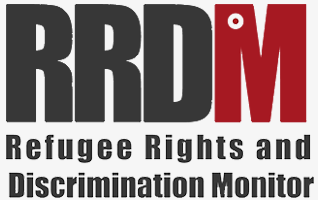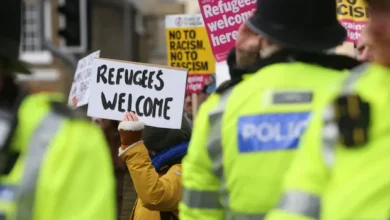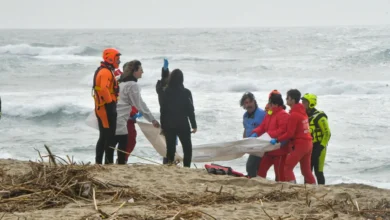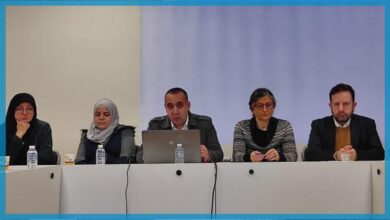‘Speak out against pushbacks, you’re an enemy of Greece,’ says refugee hero
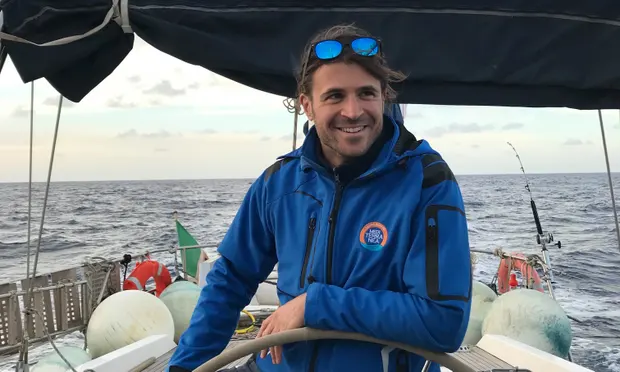
BY| The Guardian
Iasonas Apostolopoulos was due to be awarded a medal but as views on migrants in Greece shifted he now gets death threats
Once lauded as a Greek hero, Iasonas Apostolopoulos has seen the effects of being on the wrong side of his government’s policies around the illegal pushbacks on its borders, accused by the prime minister’s office of “insulting Greece”.
“If love of country means accepting the killing of refugees on our border, then I’m proud to be a traitor,” he says.
The 38-year-old, once celebrated for his efforts in rescuing refugees off the Greek coast, has in the past year been mysteriously denied a medal he was due to be awarded by the Greek president and publicly accused of insulting his country, by the prime minister’s spokesperson, for speaking out about illegal pushbacks of asylum seekers from Greece’s borders.
Apostolopoulos, who trained as a civil engineer, initially learned the ropes of search and rescue in Lesbos in 2015 from Greek fishers and has since been on numerous missions with aid organisations to rescue refugees in the Mediterranean.
In July 2021, he was notified he would be awarded a medal by the Greek president, Katerina Sakellaropoulou, for his work. Shortly before the ceremony, however, he says he was informed in a late-night telephone call from the Greek foreign ministry that his award had been cancelled. Apostolopoulos was never given a reason but media reports at the time suggested pressure had been exerted by the government to withdraw the honour.
“If you speak out against pushbacks, you’re an ‘enemy of Greece’ – this is the narrative,” says Apostolopoulos, who has criticised the government’s migration policy and highlighted news reports of asylum seekers being robbed, beaten and pushed back across land and sea borders by the Greek authorities. The practice of pushing back migrants, widely documented by human rights organisations, violates international and national law.
In February, the UN refugee agency, UNHCR, said it had noted almost 540 reports of “informal returns” of asylum seekers across the borders since 2020 but the Greek authorities continue to rebut allegations of lawbreaking. In a recent appearance at the European parliament, the Greek prime minister, Kyriakos Mitsotakis, pointed the finger firmly at Turkey. “I would urge you to think more in terms of ‘push forwards’ rather than pushbacks,” he said, suggesting that the Turkish authorities were encouraging people to cross into Greek territory.
In August, a group of 38 asylum seekers were picked up by Greek authorities after being stranded for days on an islet at the land border between Greece and Turkey, during which time a five-year-old child died. The group claim to have been pushed back and forth across the border for weeks by the authorities in both countries.
A week later, the Greek government announced that it would extend the fence at the land border with Turkey to cover the entire length of the frontier – about 136 miles.
In an increasingly tense atmosphere, Apostolopoulos has been receiving daily death threats on social media, but he says he will continue to use his platform to raise awareness about violence at Europe’s borders. “Pushbacks are designed to stay invisible. I think the only way to stop this crime is to give visibility to it,” he says.
There is a sense of sadness as he reflects on all that was done to help refugees on the Aegean islands, efforts that were recognised when islanders were nominated for a Nobel peace prize in 2016. “It was a national pride of Greece,” he says, “the idea of ‘philoxenia’ – the Greek word translating to ‘love of the stranger’.”
Now, violence against asylum seekers at Greece’s borders has become top of the agenda for EU officials, including the home affairs commissioner, Ylva Johansson, who tweeted in June that “violent and illegal deportations of migrants [in Greece] must stop now”, adding that EU funding was “linked to EU fundamental rights being correctly applied”.
Tineke Strik, a Dutch MEP from the Greens/EFA group, is one of those who have been calling for further scrutiny about funds given to countries such as Greece for border management, raising concerns that the EU may be directly fuelling human rights violations such as pushbacks.
“They [Greece] really enjoy complete impunity from the EU,” she says. “I blame the commission for that,” adding that further funding of border management should be conditional on respect for fundamental rights. “We are really pressing [Brussels] to take that very seriously.”
Strik also raised concerns about the targeting of humanitarians, such as Apostolopoulos, in Greece.
“This impunity actually fuels other things, for instance the criminalisation of search and rescuers, NGOs and journalists. If, from an EU level, nothing is said, then governments try to silence everyone in the country who criticise them.
“In Greece, you see increasingly the patterns that we have seen in Hungary for a long time and in Poland as well. I would say, if we do not intervene in Greece now, it will be more and more difficult to combat it,” she says.
“Racism and violence against the weak are poisoning every aspect of our society,” says Apostolopoulos. “For now, refugees are the ones who are being mostly targeted in Europe but sooner or later all this hatred will be fuelled against others who are less privileged.”
